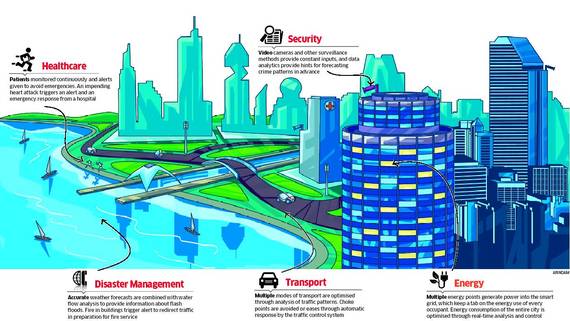There is a new organization in town and it's quietly getting the attention it deserves.
Called "Next Century Cities," it met last month with mayors and executives from 32 cities in Santa Monica, California to talk about the new economy, the critical importance of broadband infrastructure to economic wealth and well being and the vital role cities must play to succeed and survive in what is fast becoming a turbulent, knowledge driven world.
According to McKinsey and Company,
"In a world of rising urbanization...U.S. cities face turbulent times ahead as the economy strives to recover from deep recession... business and government leaders need to find ways through these difficulties if cities are to play their part in the US economy's growth and renewal."
While insuring affordable, and ubiquitous broadband is not a panacea, as a whole new economy based not on manufacturing or even service provision, but on knowledge or more precisely creativity and innovation takes shape, cities have to be ready. In large part that means fiber optic broadband because broadband is critical to living and working in the global knowledge economy.
There is simply no alternative.
Benjamin Barber, author of If Mayors Ruled The World, has written,
"The nation-state is failing us on the global scale," and predicted that "cities and the mayors that run them, offer the best new forces of good governance...They are the primary incubator of the cultural, social, and political innovations which shape our planet. And most importantly, they are unburdened with the issues of borders and sovereignty which hobble the capacity of nation-states to work with one another."
Next Century Cities says,
"Across the country, innovative municipalities are already recognizing the importance of leveraging gigabit level Internet to attract new businesses and create jobs, improve health care and education, and connect residents to new opportunities. Next Century Cities is committed to celebrating these successes, demonstrating their value, and helping other cities to realize the full power of truly high-speed, affordable, and accessible broadband."
For too long providing broadband was the exclusive domain of Telco and cable companies. In fact, in state capitols across America, legislation has been enacted to prevent the municipality from proving broadband services or playing any role whatsoever in shaping its new information infrastructure.
Early on, Philadelphia announced one of the first citywide wireless initiatives in the country. Within weeks the Pennsylvania Legislature and the governor signed a bill that would preclude any other Pennsylvania city from doing the same.
Over 100 other American cities have expressed the desire to provide such municipal services. They have been told in no uncertain terms that the telecommunications business belongs to the private sector. Read that: the existing cable or telecommunications firms.
While 20 states have passed legislation prohibiting municipal cable, according to Ars Technica "approximately 22 other states hav[e] some type of restriction on the use of taxpayer dollars for these kinds of facilities."
So far, Tom Wheeler, the Chair of the Federal Communications Commission, has been the cities friend. He appeared on tape at the inauguration of the Next Century Cities launch and has said previously that,
"If the people, acting through their elected local governments, want to pursue competitive community broadband, they shouldn't be stopped by state laws promoted by cable and telephone companies that don't want that competition."
Through Next Century Cities, leaders will gain opportunities to work with partner cities, share knowledge and assist in development of next-generation broadband networks said cautious Deb Socia, Executive Director of the new venture. She clearly did not want to be seen as a political organization. Fair enough, there are a lot of sound reasons why cities need to work together, collaborate on best practices and lessons learned as they forge their own unique vision as cities of the future.
The same day as the launch, however, Lafayette Mayor Joey Durel and Chattanooga Mayor Andy Berke blogged in the Washington, D.C., publication, The Hill, that,
"no city can even think about a gig if it is restricted from doing so--either by the market or laws. In Lafayette, an incumbent Internet provider sued to prevent us from entering the market, and we had to take our case all the way to the Louisiana State Supreme Court to establish our right to build."
For cities, and for America, we must develop the infrastructure of the 21st century much faster than we have been. We must allow communities to begin using these new infrastructures by clearing away the regulatory hurdles and logistical doubts. We must develop a new deregulatory framework to promote broadband deployment and continued innovation. We must in short, establish and sustain a National Infrastructure Initiative that encourages local and regional initiative to get our country back on track.
Broadband today is as important as waterways, railways and highways were in an earlier era. Having broadband is a necessity. It is something every man and woman and child depends on to succeed in the new economy. It is a must for business, government and every community to succeed, let alone survive in the new economy.
The city is and has been the crucible of civilization; the center of commerce, and in this new age, can and must be the incubator of creativity; the place where people and cultures and ideas wash against one another, producing the inventions and innovations the world needs and wants, and the finance and marketing plans to support them.
